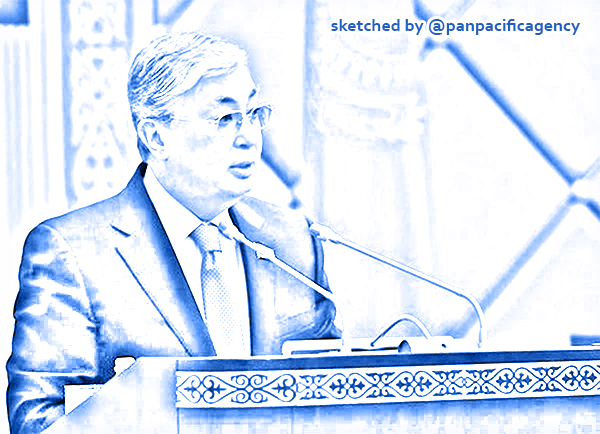[Analytics] Kazakhstan under president Tokayev

Kassym-Jomart Tokayev took over as Head of State following presidential elections in Kazakhstan. Photo: Modern Diplomacy. Sketched by the Pan Pacific Agency.
Around two years ago, a change of leadership took place in Kazakhstan, when Kassym-Jomart Tokayev took over as Head of State following presidential elections. Since then, numerous reforms have been implemented in the country. Paulo Afonso Brardo Duarte specially for the Modern Diplomacy.
Prior to these elections, Nursultan Nazarbayev was the president for almost three decades until 2019 and built a foundation that enabled Kazakhstan to become the biggest economy and top investment destination in the region. Under Nazarbayev, Kazakhstan also managed to build good relations with all its neighbours, as well as with Europe and the United States.
There has been a shift in focus after 2019. President Tokayev is concentrating not just on economic reforms and foreign relations, but also on political changes in the country. Prior to change in leadership, the country primarily focused on economic development and investment attraction. Indeed, Kazakhstan still has the ambition to become one of the top 30 most developed countries in the world. Yet according to Kazakhstan’s current president, political changes are necessary to achieve economic development. One may wonder why these reforms matter outside of Kazakhstan. Yet the country is the top trading partner in Central Asia for the European Union and plays a key role in facilitating trade between China and the rest of the world through the Belt and Road project. Kazakhstan is also a founding member of the Eurasian Economic Union and is an active member of the international community, supporting the United States, Russia and other global powers in the resolution of conflicts in Syria and Afghanistan. Ultimately, the political and economic course of Kazakhstan impacts not only the country itself, but also the wider region and beyond.
One of Tokayev’s most significant changes is bringing the population closer to politics, and establishing what he calls “a listening state” – a government that listens to the feedback and criticisms of the population. To enhance dialogue between the government and the people, a National Council of Public Trust was established by Tokayev in 2019. Its aim is to develop specific proposals for reforms and legislation, taking into account the suggestions of civil society and the wider public. Making the national and local government more accountable improves its effectiveness and enables it to better fight long-lasting problems, such as corruption. In this regard, the country’s legal system has been transformed by transitioning it to a service model of work, which calls for a more active and responsible role for law enforcement personnel.
Public administration also required substantial reform as it is plagued by serious bureaucracy. As such, Tokayev instructed the government to reduce the number of civil servants by 25% while also hiring younger cadres. The President, who himself frequently uses social media, also made it a priority to digitise government services to increase efficiency.
In addition to political reforms, Tokayev has prioritised diversifying the economy to avoid excessive dependence on natural resources. For this reason, despite the lure of focusing on oil, gas, uranium and other raw materials that Kazakhstan exports, Tokayev has instructed the government to maximise the potential of agriculture, especially due to the fact that Kazakhstan neighbours China and other rapidly developing Asian countries, which require vast amount of seeds, grains and livestock.
Social reforms have also been realised. Tokayev recently stressed that “economic reforms are justified and supported only when they increase the income of a country’s citizens and ensure higher standards of living”. In practice this means protecting the most vulnerable, as well as individuals and companies that depend on loans to start a business. As such, Tokayev is aiming to expand the amount of bank loans, and direct them to companies that increase value by means of innovation, while reducing the number of inefficient enterprises run by the state. To support those that suffered the most from the economic consequences of the pandemic, the president offered his support to cancel penalties for bank loans.
Another interesting social measure that is likely to have long-term effect is Tokayev’s attempt to gradually revert the idea that higher education should be the ultimate goal of every student. Instead, Tokayev aims to reduce the number of universities to promote vocational centres and colleges that teach specific technical skills. The belief is that this is necessary in order to adapt to the needs of the market, which requires a variety of specialists.
Overall, while it is too early to assess the long-term impact of Tokayev’s presidency and his reform programme, it is clear that he is trying to fight old demons domestically, by shifting Kazakhstan away from old Soviet thinking and system of governance. The interplay between the domestic and external challenges aggravated by the test of COVID-19 and its consequences, will demonstrate whether Tokayev’s reforms are strong enough to help the country cope with the new era.